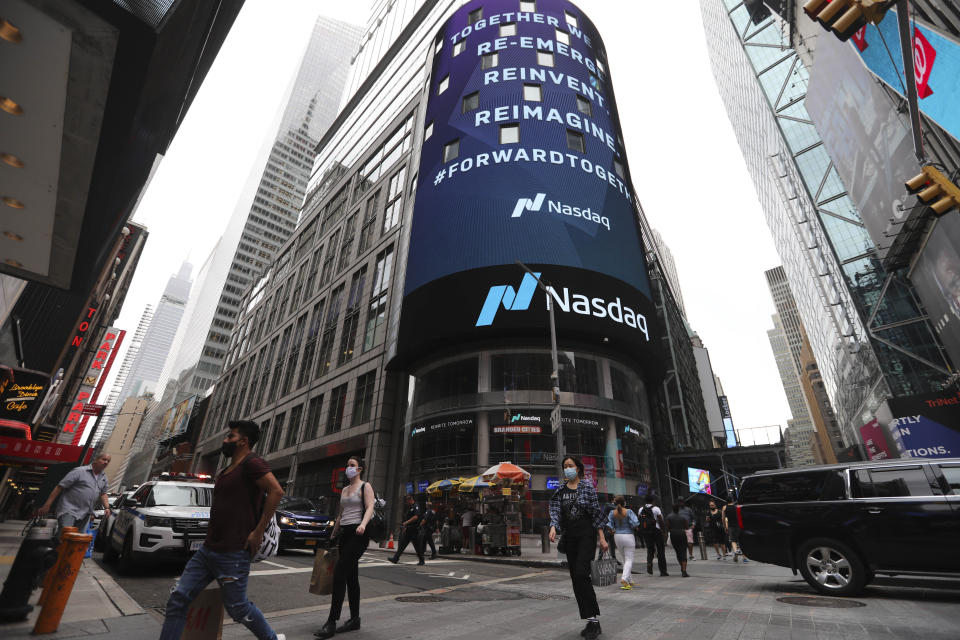Why stocks crashed and why you shouldn't worry

Thursday’s tech stock sell-off was most likely profit taking rather than the first signs of a looming bear market or fundamental re-rating of the tech sector.
Analysts said on Friday that diving stock prices seen in the US the day prior shouldn’t worry investors too much.
“In many ways it is quite healthy to see some steam coming out of this particular pressure cooker,” Jason Hollands a managing director at Tilney Investment Management Services, said.
READ MORE: Sell-off on Wall Street hits European stocks
US stocks sold-off sharply on Thursday, led by tech stocks. Apple (AAPL) fell 8%, Microsoft (MSFT) lost 6%, and market darling Tesla (TSLA) dropped 9%. The tech-heavy Nasdaq (^IXIC) dropped 5% and looked set to drop a further 1.1% at the open on Friday (NQ=F).
The sell-off sparked a broader fall across global equities, reversing gains seen in Europe earlier in the day. The benchmark S&P 500 (^GSPC) also fell 3.5%.
However, analysts across the City of London and Wall Street said investors shouldn’t worry too much about the correction.
“Equities could be in for a bumpier ride but we think they will continue to climb the wall of worry,” Barclays’ head of European equity strategy Emmanuel Cau wrote in a note on Friday.
Context is key to understanding why Cau and many others aren’t bothered by Thursday’s price action. US stocks have rallied strongly since March’s COVID-19 sell-off and stock markets enjoyed their best August in 34 years.
READ MORE: Stock futures mixed after worst selloff since June; investors eye jobs report
However, the rally — which has been particularly pronounced in tech stocks — has left share prices inflated well above averages. FAAMG — Facebook (FB), Apple (AAPL), Amazon (AMZN), Microsoft (MSFT), and Google (GOOG) — had been trading 41% above their 200-day moving average share price, Bank of America said on Friday.
“The surge in share prices seen in the last few weeks started to raise bubble concerns,” Cau wrote. “Some of the more ‘concept’ type tech/new economy stocks looked increasingly frothy, to say the least, having overly benefited from Robinhood users’ enthusiasm and fear of missing out.”
As a result, some type of correction looked inevitable.
“Many market watchers and investors – including us - have been pointing out that valuations in these parts of the market have become too bloated,” Hollands said.
There was no clear cause for the beginning of the selling on Thursday but bubble fears likely accelerated the sell-off once share prices started falling. With investors fearing we were near the top, many would have looked to lock in profit by selling as soon as prices started to dip.
“There was no single catalyst to blame, other than the increasingly unrealistic valuations in the tech sector setting the stage for an eventual reality check,” Marios Hadjikyriacos, an investment analyst at XM, said.
READ MORE: Wall Street ends best month in decades
The sell-off may have been exaggerated by the timing. September is historically the worst month for returns in US equities, a puzzling phenomenon that some people put down to portfolio rebalancing or profit taking after the summer holidays.
“Thursday’s sell-off might just have been people locking in some of the stellar gains made on tech stocks this year,” Russ Mould, investment analyst at stockbroker AJ Bell, said.
Whatever the reason, analysts expect the upward trend for equities to continue.
Mark Haefele, chief investment officer at UBS Global Wealth Management, said stocks were “well supported by a combination of Fed liquidity, attractive equity risk premiums, and an ongoing recovery as economies reopen from the COVID-19-induced lockdowns.”
Bank of America predicted a “wobble” but said market signals were still bullish.
And Barclays’ Cau said: “We remain of the view that the growth-policy tradeoff, the lack of alternatives and the still light positioning as a whole are supportive of a further grind higher in equities.”
“It is important not to lose sight of the bigger picture,” Hadjikyriacos said. “Both the S&P and the Nasdaq are now simply back at the levels they were trading in the middle of last week, so investors are not exactly panicking.”

 Yahoo News
Yahoo News 